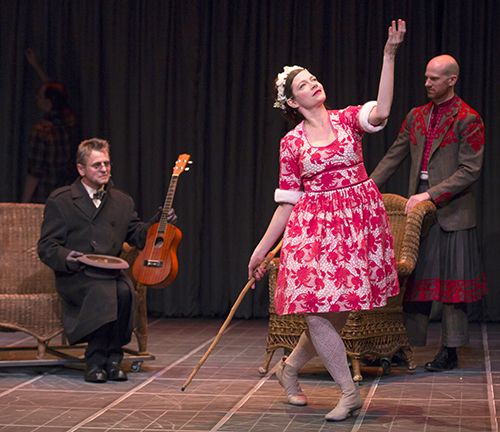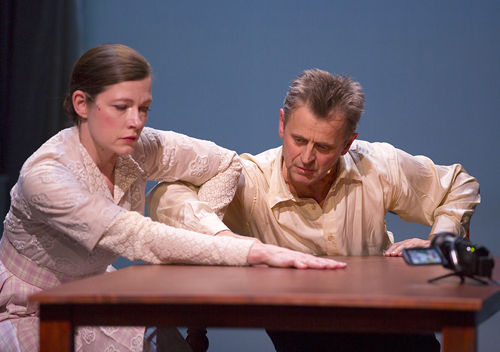Mikhail Baryshnikov, Tymberly Canale and Aaron Mattocks in Man in a Case: a giddy and painful attraction of opposites. Photo by T. Charles Erickson
Any tale of love by Anton Chekhov is bound to be a sad tale -- put two together and the shapes of sadness multiply. Adapt them for the stage and present them with grace, invention and deep humanity, as Mikhail Baryshnikov and a small company of actor-dancers are doing in Man in a Case, and sadness assumes an unusually compelling allure.
The play, which has been touring nationally since its premiere in Connecticut last spring, settled into Berkeley Rep's Roda Theatre on Sunday. It will be there for a scant three weeks.
Drawn from the little-known stories Man in a Case and About Love, the production distills their essence into 75 minutes of dialogue, mime, dance, music, projections and videos that often capture the live action from many angles, as might be seen in an array of surveillance cameras. (The stories, incidentally, can't be found in most collections; you can read them here).
Working with a concept suggested by Baryshnikov, the narratives were adapted and directed by Annie-B Parson and Paul Lazar, a Brooklyn-based couple whose Big Dance Theater has been stretching the boundaries of experimental staging for more than 20 years. With Man in a Case, emotionally driven innovations far outweigh the kind of cerebral motives that are so common to avant-garde performance.
Baryshnikov, who just turned 66, still displays flashes of the agility and athleticism that made him one of the world's most famous dancers for decades. But this production takes him in directions that allow little physical flashiness, though he does show those skills in a spectacular fall down a long flight of stairs and in a cheerful, jazzy dance interlude between the tales.
His principal tools here are facial and vocal, conveying a relatively narrow spectrum of intense feelings and concerns with economy and clarity. A petty tyrant in one play and an inhibited lover in the other, this is a new and thoroughly impressive Baryshnikov.
The stories explore facets of repression, compulsion and social convention, all with painful consequences.
In Man in a Case, Baryshnikov plays a small-town schoolteacher named Belikov, whose obsessive devotion to rules not only shapes his own life but also the lives of colleagues, pupils and even his community. He utters few words, never raising or inflecting his voice, and rarely flaunts his customary machine-like gestures, but his very presence intimidates.
And when Belikov's workday is done, he retreats to solitude in a tiny room where no fewer than seven locks guard his door.
Still, somewhere deep inside his cocoon is a vital spirit waiting to emerge, waiting for some power to shatter the walls that encase him. That irrepressible force arrives in the form of a young woman whose gregariousness, energy and freedom from inhibition represent Belikov's opposite in every possible way. Tymberly Canale fills the role with engaging vitality; she also returns in About Love with unaffected refinement and tenderness.
Her influence on Belikov is explosive, transforming him into a man as giddy as Scrooge on Christmas morning. The metamorphosis is short-lived, however. Habits forged over a lifetime can't be tossed aside easily, especially when his dignity, self-respect and social standing all derive from adherence to a rigid code of behavior. Fractured emotional walls can't be restored to original strength, and a return to Belikov's imperious former self is impossible. Tragedy is inevitable.
Baryshnikov and Canale in About Love: Their contact is deep but minimal Photo by T. Charles Erickson
In About Love, Baryshnikov portrays a man who falls deeply in love with a married woman, and Canale plays the woman who inspires and clearly reciprocates his ardor without breaking her marital vows. Both remain prisoners of convention, anguished, but circumspect. Their agony plays out most compellingly in a slow dance that is executed while lying on the stage but clearly visible in simultaneous projection on a large screen. The impact is heartbreaking.
Although the costuming and music frequently suggest a setting in 19th century Russia, placing the action in any specific time or place is impossible. Among the incongruous elements are a wildly funny conversation among turkey hunters in northern Florida and the furnishings of Belikov's room, where five television sets often play the same image simultaneously. Considering the universality of the play's human interactions, I question whether those contradictions are needed to suggest timelessness. But that's a tiny quibble about a small play with a huge heart.
'Man in a Case' runs through Feb. 16 in Berkeley Repertory Theatre's Roda Theatre, 2015 Addison St., Berkeley. Tickets are $45-$125 (subject to change) from 510-647-2949 or the Berkeley Repertory Theatre's website.

